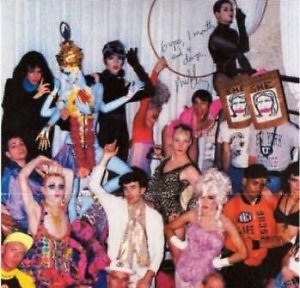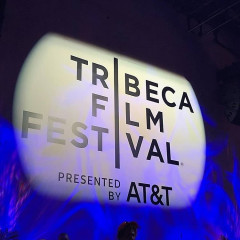Go HERE for more photos by Baris at The Bowery Hotel, and tag yourself and your friends!
This past Friday, Billy Corben premiered his latest movie, Limelight, as part of the Tribeca Film Festival. Limelight documents the rise and fall of Peter Gatien, the legendary nightclub owner who arguably became a scapegoat in Giuliani’s New York mid 90’s drug wars. Afterward guests hit the Bowery Hotel where we spoke with Jen Gatien, Peter's daughter and a producer of the film, and Steve Lewis, legendary NYC nightlife figure.
 Peter Gatien, a visionary businessman, came to the states from Canada with high hopes of making it in New York, and by the 80's was monopolizing New York nightlife with his church-turned-club, The Limelight, which you will recognize now as the Limelight Marketplace (left).
Peter Gatien, a visionary businessman, came to the states from Canada with high hopes of making it in New York, and by the 80's was monopolizing New York nightlife with his church-turned-club, The Limelight, which you will recognize now as the Limelight Marketplace (left).
The Limelight was unique not only because it was a ginormous church full of kids on ecstasy, but because the promoters had perfected a precise balance of diversity in the crowd. They made sure to maintain an equilibrium of "20%" of "every kind" of young person. It was one of the most legendary and remembered things about Limelight -how all the club kid subcultures were brought together, how massive of a presence it was in New York, and its ironic architecture. These were blowout parties in a huge, stunning place, and they were epic in a way that New York might never be again. Incredibly, the film was able to get close to expressing a near-inexpressible experience.
Right around the time that Gatien was revolutionizing New York club culture, Giuliani was trying to revolutionize New York into a safer and less cracked out place. Quickly enough, Gatien was identified as a key figure in drug investigations, and even more quickly, it became the government versus Peter Gatien. The movie Limelight tells the story of what happened when New York turned on one of its own icons -and a lot happened.
It's a brilliant film, tracking the sociology of the city, questioning both drugs and government, and examining an ever- changing youth culture, with extensive accuracy and whimsical sensitivity.
A lot of great nightlife names stopped by to show support, including Jen Gatien (daughter to Gatien and producer of the film), Junior Vasquez, the composer for the sound track, club owner Eric Goode, and former Limelight manager and current Blackbook nightlife write Steve Lewis.
 Steve admitted to being nervous about the film:
Steve admitted to being nervous about the film:
“Hopefully they got it right. On the other side of that nervousness is, I don’t even know what ‘right’ is. I only have my own perspective.”
He said that his most unforgettable Limelight memory was the night that Michael Alig, famed club-kid-turned-killer came up to him asking to borrow Lewis’ car because,
“He said, ‘I just killed Angel and I want to put the body in the back and get rid of it.’ I said, ‘Michael, get the fuck away from me.’ Later, a friend of mine came up to me and said, ‘I just heard an interesting story.’ I said, ‘I just heard an interesting story.’ He said, ‘You know the thing about that story? It might be true.’ That went up my spine like a Limelight ghost.”
Limelight ghosts are a part of the Limelight legacy, naturally because of the gothic design of the old church, but they interestingly aren't touched on in the film.
In addition, Jen Gatien had some memories of a time in New York that might never happen again. Because she was the daughter of the nineties kingpin, her most memorable moments came with a unique set of risks.
“I was at Palladium and Marky Mark was onstage. He randomly pulled me onstage and I was dancing. I looked up and I could see my father with his arms crossed looking down. I was like, ‘I’m in trouble.’ I was seventeen. Security followed me for the rest of the night and made sure I went home.”
Palladium, another one of Gatien's major ventures, was a concert hall and nightclub, a hotstop for the music and gay scene. It ended up being bought out by NYU and is now a dining hall.
The movie has potential to be controversial because it explores each bias and the pros and cons of the Gatien story. The filmmakers approached the script with slight trepidation. Corben mentioned that it was his first film set outside of Miami.
“Hopefully New Yorkers won’t pillage us and send us home!”
He’s excited about the release, though, and says that the film is intended to have a “great micro, macro-perspective.” It certainly does. When the film ended, the main question on everyone’s mind during the Q&A was, “When will it come out on DVD?”
[The Club Kids] [NYC Nightlife's Past is Killing its Present] [The Limelight Marketplace Grand Opening: If This Mall Could Talk]
















.jpg)
.jpg)



.jpg)
.jpg)
.jpg)


.jpg)

